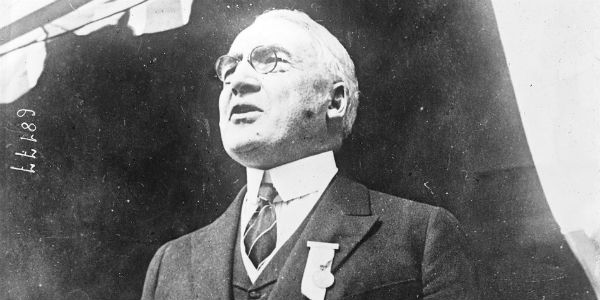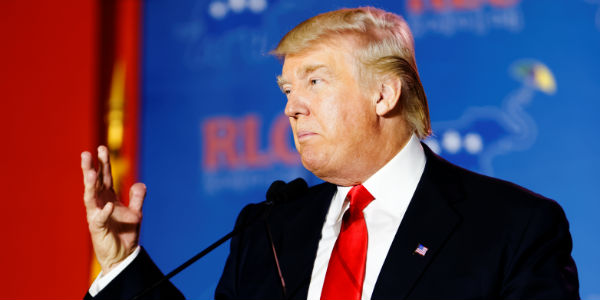A century ago, Warren Harding prefigured Trump’s brand of strongman nationalism
Donald Trump will not be the first US president to espouse a closed-borders, ‘America First’ nationalism. Luke Cooper traces the roots of Trump’s protectionism back to century-old arguments made by Warren Harding, the 29th President.

Warren Harding in 1921. Photo: Bibliothèque nationale de France. Public domain
It was springtime in America, but citizens were more preoccupied with the fallout from a distant war and an economic recession at home than they were with the change of seasons. Europeans may have looked on anxiously as the pressures of a brutalised capitalism and great power politics appeared to have toxified a deeply polarised American public debate. But with their own countries facing a similar, if not even more egregious, rise in racial populism, they were hardly in a position to judge.
For many Americans, world events had distilled a clearer sense in their own minds of who they were and who they strived to be. In New York, a large crowd gathered on 18 May convinced that they were on the cusp of a new dawn of American greatness – if only, that is, the enemies of the country’s salvation could be assuaged, forcefully if necessary, both within and without. An aspiring presidential hopeful spoke to their passions. He imagined an America in which the ordinary working man could take pride in his (sic) and the country’s accomplishments. They had found, the speaker argued, the one and only solution to the problem of a ‘mongrelised’ immigrant people: unwavering commitment to the patriotic cause:
“We came to the awakening… with sympathies divided, with prejudices revealed, with divided sentiments menacing not only our tranquillity but the nation’s very existence, we saw the need for a consecration, and we commanded it. We found the need of awakening, and the republic awakened. We found the growing peril and overwhelmed it with patriotism. We saw the need of dedication and consecration and we dedicated and consecrated. We came to realise that no nation could survive half loyal and half disloyal, and we declared loyalty to the Republic. We saw as never saw before that privileges and advantages of American citizenship call for the duties and devotions of that citizenship, and it was proclaimed by the conscience of the Republic that every man who fattens his existence on American opportunity must be an American in his heart and soul. . . . The United States is 100 per cent American today, and we mean to hold it so henceforth and forever.”
The year was 1919. The audience was the American Defense Society, a far right nationalist organisation formed in 1915 to agitate for American entry into the Great War. They were dedicated, among other things, to “arouse the hundred millions of Americans to a full realisation of the German plan for world domination”. But while this might suggest a gathering of interest to only a small current of American society, the event was no fringe affair. On that evening in May the speaker was one Warren Harding, a Republican who saw himself as a fervent patriot totally committed to the ideal of America, and who would soon become the 29th president of the United States.
In his earlier rise to national politics as a senator in Ohio, Harding had advanced a slogan whose meaning would echo down the ages, “Prosper America First”.[i] He saw the war in Europe as merely the expression of a bitter struggle for industrial and commercial supremacy amongst the world’s nations. For Harding, America had been unduly benevolent towards its rivals when it slashed its customs tariff in 1913. This idealistic opening to the world threatened, he believed, the inner sanctum and commercial vitality of American life. He promised to oppose it at all costs.
Harding’s brand of virulent nationalism is often recounted today in terms of ‘American isolationism’. But this ignores how he was an explicit advocate of foreign intervention. He merely criticised the construction of a liberal international order that he saw as limiting America’s freedom to forcefully prosecute its own interests.
It is more accurate to see Harding as part of a self-consciously colonial tradition in American politics, which had evolved from the belief in American Manifest Destiny at home through to the annexations seen in the wars with Spain and the Philippines abroad. For this tradition – which famously counts among its number Theodore Roosevelt – having perfected a system of governance with no equivalent on the global stage, the American people were duty bound to expand, by force if needed, the territories under its jurisdiction and build a powerful national force in the world.
For his part, Harding appeared to see no limits to American expansionism. He called for the full annexation of Cuba in 1897.[ii] In 1889, he had proposed a conquest of Canada.[iii] Neither did the years soften this colonial commitment. In 1915, he argued that America had a ‘civilising obligation’ in Mexico and urged the country not to repeat what he called the ‘blunder of Cuba’ and instead ‘to go in, and go to stay’.[iv]
Despite his supposed commitment to the American constitutional tradition, Harding had a fascination with dictatorial strongmen that often translated into support. He condemned Wilson’s support for the Mexican Revolution and heaped praised on the country’s overthrown dictator, Porfirio Diaz, for his strong, patriotic government:
“He ruled with an iron hand because it was necessary. No other course could have succeeded. The Mexican mass was unfitted for self-government, so Diaz dictated, but he did so with a lofty patriotism, and a high consideration for his country’s good and its advancement.”[v]
For Harding, America was, first and foremost, a great nation, and not a constitutional ideal. He believed nations required strong leaders and countries ruled by individuals with a sense of the national purpose should be respected, perhaps even admired.
As his speech to the American Defense Society illustrated all too well, Harding was prepared to coquet with organisations that took these inclinations to quite an extreme.
Harding’s ghost

Donald Trump at the Republican Leadership Conference in New Orleans, 2014. Photo: Michael Vadon via a CC-BY-SA 2.0 licence
Historical analogies are often misleading devices. But it is difficult not to be struck by the parallels between Harding’s early 20th century American nationalism and Donald Trump’s bid for the White House. For the latter’s success perhaps lies in it bringing back to the surface of the country’s political life a violent ethnic nationalism that was for years suppressed, but never wholly absent from the fabric of American culture. In a New York Times interview earlier this year, David Sanger asked Trump if his foreign policy could be summarised according to the dictum, ‘America First’? Sanger was, of course, aware of the historical significance of the term as the clarion call of the tradition euphemistically referred to as ‘American isolationism’. Trump evidently was not, but was happy to accept this description:
“I like the expression. I’m ‘America First.’ We have been disrespected, mocked, and ripped off for many many years by people that were smarter, shrewder, tougher. We were the big bully, but we were not smartly led. And we were the big bully who was — the big stupid bully and we were systematically ripped off by everybody. From China to Japan to South Korea to the Middle East, many states in the Middle East, for instance, protecting Saudi Arabia and not being properly reimbursed for every penny that we spend, when they’re sitting with trillions of dollars.”
So taken were Trump’s team with the slogan, ‘America First’, at the end of August they would launch a phone app in its name. It summarised something fundamental about his whole approach to the global order. Indeed, the nature of Trump’s character can too often obscure the fact there is a policy coherence that situates him resolutely in the tradition of American nationalist protectionism. Consider, for instance, these remarks of Harding in 1918 and the obvious parallels with Trump’s message today:
“The theory of banished barriers is beautiful, the practice is destroying. American labor will never consent. We must have protection to hold us to what we are, and send us to greater eminence.”[vi]
Trump may not have Harding’s gift for oratory, but almost identical positions and sentiments have been a central part of his campaign’s appeal to the post-industrial American worker. The outside world is cast as a place of threat, corruption and malpractice that has ‘ripped off’ the people of the United States with the assistance of a privileged liberal elite serving these foreign interests. A cosmopolitanism that Trumpists associate with increased flows of people, capital and goods across borders is seen as an existential threat to an imagined sense of what America is and should be.
Political scientists will inevitably ask what type of sociological context might be liable to produce this popular backlash against a liberal economic order. And, while all situations are contingent and unique, some parallels with the world that Harding inhabited and the globalised order of the 21st century can be cautiously observed. The two decades prior to the First World War were a period of relative trade liberalisation and rapid social change, profoundly recasting the economic and cultural geography of the United States. This period has often been seen as a precursor to the free market globalisation of today.
Trump’s rise is also routinely viewed as a backlash against the globalisation of the current economic order. He will oversee a regime committed to an active policy of de facto de-globalisation, even including a renegotiating of Nafta on ‘America First’ terms.
The relationship between the economic base and nationalism is, however, inevitably complex. Harding had a vision of the look and feel of American society that was nationally homogenous and aggressively strong in the world. This imaginary of the future he presented to citizens cannot be reduced to certain interests or economic pressures. It was culturally created by an array of historical causes. Why this would have a more visceral domestic appeal than Woodrow Wilson’s liberalism or Eugene Deb’s socialism is an open, contingent issue of historical analysis. Similarly, the precise way in which Trump’s radical nationalism has successfully mapped onto the economic geography of contemporary American capitalism raises issues of how space, time and belonging are comprehended that we may still not fully understand.
Beyond the closing of the economic border the other parallels with Harding’s worldview are no less remarkable. Just as Harding heaped praise on Porfirio Diaz, Trump offers Vladimir Putin warm words and implied support, even as the usual zealots of the national interest warn of his grave threat to American security. Among radical nationalists the strongman, it seems, has a persistent appeal, defying all logic.
Trump also shares Harding’s propensity to repeatedly imply recourse to violence and coercion as a resolution to domestic political conflict. ‘No nation could survive half loyal and half disloyal’, Harding told the American Defense Society. The meaning of this appeal to national fidelity was eminently context-dependent. Harding’s view of what this should look like can be seen by the fact he was addressing an organisation that advocated mass internment of disloyal citizens during the First World War.[vii]
Violence and force occupies a similarly animating thread to Trump’s discourse. “If she gets to pick her judges, nothing you can do, folks”, Trump told a rally in North Carolina. “Although the Second Amendment people, maybe there is”, he added, in a now infamous reference to the constitutional rights of gun-owners. Not content to apparently encourage a political assassination on American soil, in the second presidential debate he pledged to throw Hillary Clinton in jail if elected.
Is Trump even that far removed from the assertive colonial mentality that so clearly conditioned Harding’s conviction about the proper order of human civilisation? Trump may not propose the annexation of Mexico. His headline campaign commitment, however, to ‘build a wall and make them pay for it’ involves such a total disregard for sovereignty that it comes very close to a classical sense of empire.
The building of the wall is, of course, the concluding point of a wider vocabulary of racism that has condemned Hispanics as rapists and called for an end to Muslim immigration. Remarkable as it might seem given the fundamental racism of the late 19th and early 20th century world, Trump’s implied imaginary of America as an essentially white domain goes further along this road than Harding appeared to.
Harding believed that through a sense of patriotic duty and authoritarian promotion of the national spirit diverse cultures could be assimilated into the American way of life. While this was hardly the epitome of liberal progressivism, Trump seems to offer a much more explicitly racialised image of the American nation.
A moral crisis
This comparison shows Trump’s continuum with a resuscitated American past. It does not venture any predictions for the future. But plainly within American society there is a deep sense of a country suffering a severe moral crisis, where fear and suspicious have broken febrile bonds of trust and community. A social contract that has long been strained by the reality of neoliberal insecurity is surely at its crisis point. Perhaps it is this breakdown of trust in the order of American society that has catalysed the candidature of someone willing to breach every imaginable moral code.
The fires of ethnic nationalism ignited over the course of this campaign will be extremely difficult to put out. It is difficult to escape the conclusion that America, and Western societies more generally, may be on the cusp of a whole new era of moral and political regression.
Notes
[i] Randolph C. Downes, 1970, The Rise of Warren Gamaliel Harding 1865 – 1920, (Columbus: Ohio State University Press), chapter 11.
[ii] The Marion Star, 22nd November, 1897.
[iii] The Marion Star, 25th April, 1889.
[iv] The Marion Star,13th September 13, 1915.
[v] The Marion Star, 3rd July, 1915.
[vi] Cited in Randolph C. Downes, 1970, The Rise of Warren Gamaliel Harding 1865 – 1920, (Columbus: Ohio State University Press), pp. 255 – 256.
[vii] See also William T Hornaday, 1919, Awake! America Object Lessons and Warnings (New York: Moffat Yard and Company).
This post represents the views of the author and not those of Democratic Audit. It first appeared at The Disorder of Things.
 Luke Cooper is Senior Lecturer in Politics at Anglia Ruskin University. He is currently writing a book on the historical sociology of the long 19th century.
Luke Cooper is Senior Lecturer in Politics at Anglia Ruskin University. He is currently writing a book on the historical sociology of the long 19th century.





 Democratic Audit's core funding is provided by the Joseph Rowntree Charitable Trust. Additional funding is provided by the London School of Economics.
Democratic Audit's core funding is provided by the Joseph Rowntree Charitable Trust. Additional funding is provided by the London School of Economics.
My piece contrasting Warren Harding to Donald Trump has been cross posted to the LSE’s @democraticaudit https://t.co/CFb73FKfd8
https://t.co/1vwgeRXNi4
A century ago, Warren Harding prefigured Trump’s ‘strongman nationalism’ https://t.co/DB6H5yntzT
A century ago, Warren Harding prefigured Trump’s brand of strongman nationalism https://t.co/DB6H5yntzT
A century ago, Warren Harding prefigured Trump’s brand of strongman nationalism https://t.co/JQKDhmyiNu https://t.co/2YEJgmHqv1